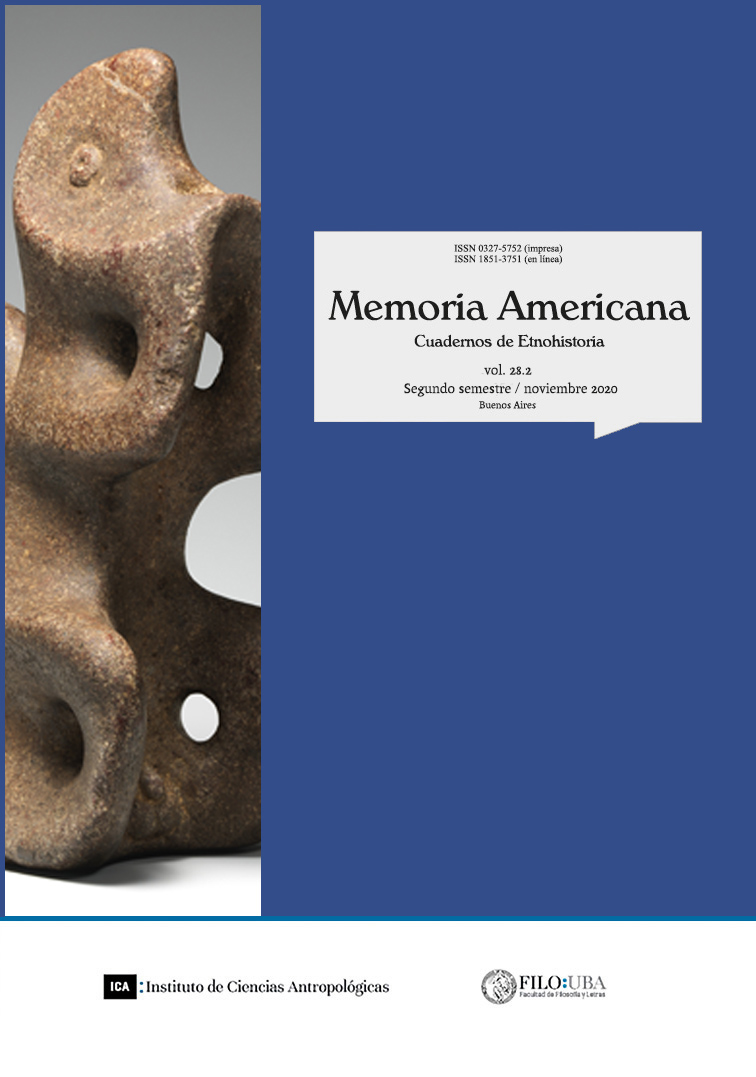De-indianization and evangelical ethnicity in the foothills and the Andean highlands of Jujuy. An historical ethnography
Abstract
This paper proposes a historical and comparative ethnography on the first evangelical expansion in the Andean foothills and the highlands of the province of Jujuy, Argentina. Although under different ecological and demographic conditions, this evangelical expansion occurred during the first half of the 20th century as part of the same process, as it was driven by Christian Brethren missionaries and later by indigenous evangelists. These facts occurred in the framework of the construction of the Nation State and under the domination of enclave economies -sugar mills in the foothills and mining in the highlands. The encounter of Guaraní and Colla populations with this new religion and how they adopted it tended to a process of de-indianization and towards the configuration of an evangelical ethnicity.Downloads
Copyright (c) 2020 Memoria Americana. Cuadernos de Etnohistoria

This work is licensed under a Creative Commons Attribution-NonCommercial-ShareAlike 4.0 International License.
Los derechos de autor son cedidos a Memoria Americana. Cuadernos de Etnohistoria, no obstante los autores podrán recuperarlos y reproducir su trabajo en otros medios o formatos previo envío de solicitud al Comité Editorial. En tales casos, deberá citarse a Memoria Americana. Cuadernos de Etnohistoria como primera publicación del trabajo y el mismo queda bajo una licencia Creative Commons CC BY NC SA 3.0 Attribution- Non Commercial -ShareAlike 3.0, la cual provee libre acceso inmediato a sus contenidos pues se rige por el principio según el cual hacer disponible -en forma gratuita- la investigación al público fomenta un mayor intercambio de conocimiento a nivel global.
Los autores deberán remitir el siguiente formulario de cesión de derechos y compromiso de originalidad:
Cesión de derechos y compromiso de originalidad
Al Comité Editorial de Memoria Americana, Cuadernos de Etnohistoria
Por la presente declaro ser el autor del trabajo titulado (nombre del artículo), el mismo es original y propio y no ha sido publicado en ningún formato o soporte con anterioridad.
En caso de ser aceptado para su publicación en Memoria Americana. Cuadernos de Etnohistoria (número/año) cedo los derechos editoriales que me corresponden por el aludido artículo para su publicación en todos los formatos que posea la mencionada revista.
Si quisiera publicar este artículo a través de otro editor o en otro lugar me comprometo a solicitar el correspondiente permiso por escrito al Comité Editorial de Memoria Americana. Cuadernos de Etnohistoria. De ser afirmativa la respuesta del Comité Editorial me comprometo a lo siguiente:
- especificar lugar, editorial y fecha de la primera publicación del artículo en la nueva publicación
- realizar esta republicación sólo luego de transcurridos un año calendario desde la fecha de la presente nota de cesión de derechos
FIRMA
Aclaración











